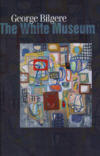The White Museum
The White Museum is written in the casual, chatty style similar to that of Billy Collins. Bilgere has a dry sense of humor that simultaneously pokes fun and is hyper-aware of his standing as a white, middle-aged man. Like Collins, his humor often takes a turn into the dirty-old-man realm, referring to “the girls” “trying out their newfangled breasts” in “Solstice,” and his “star[ing] at the breasts / of that sixteen-year-old girl / in the sky-colored bikini. Touching them / would mean the electric chair, / but still…” in “Americana.”
The White Museum is written in the casual, chatty style similar to that of Billy Collins. Bilgere has a dry sense of humor that simultaneously pokes fun and is hyper-aware of his standing as a white, middle-aged man. Like Collins, his humor often takes a turn into the dirty-old-man realm, referring to “the girls” “trying out their newfangled breasts” in “Solstice,” and his “star[ing] at the breasts / of that sixteen-year-old girl / in the sky-colored bikini. Touching them / would mean the electric chair, / but still…” in “Americana.”
Still, when not being a little creepy, the collection has many good qualities that make it worth reading. His poem “View from the Deck” was my favorite in the collection. In this poem, he describes a summer day and his brief encounter with his neighbor, a woman with cancer. He reflects on how a person’s having cancer completely changes everyone else’s perspective on him or her:
Her snapdragons glisten by cancer-light,
the finches at her feeder
are cancer-lovely, and even the titling
garage, paint peeling in the dusk, glows
with the cancerous beauty of old garages.
He ties this thought into his own personal experience of losing his mother to cancer, as the neighbor speaks to him “in cancer, a language [he] learned / from [his] mother, who spoke it / beautifully.” The poem ends on a note of hope, as he answers his neighbor with:
The sprinkler bends to silver
the primrose, stands straight up,
then goes down for another look. Yes,
I say, in my perfectly inflected cancer,
and tomorrow’s supposed to be
even nicer.
The easy-going, colloquial tone of Bilgere’s work makes it easy for the reader to enter his poems. The reader has a language they recognize, with poems that use contractions like “don’t” and familiar phrases like “there’s no / doubt about it” (“Ardmore Tree Service”). It is difficult to do humor well in poetry, and though Bilgere’s work falters sometimes because of his attempts at humor, overall he successfully marries everyday language with irony, appealing to those who are familiar and to those who are just beginning to delve into modern poetry.





